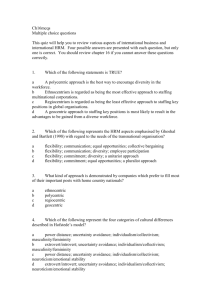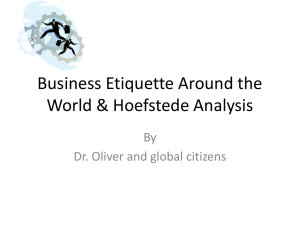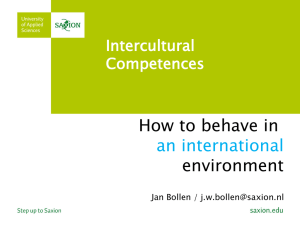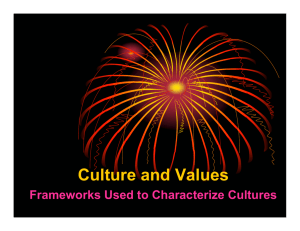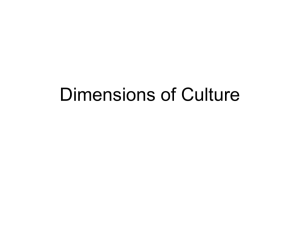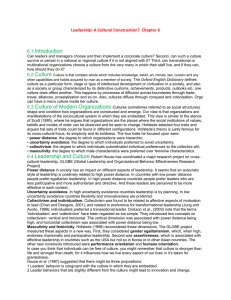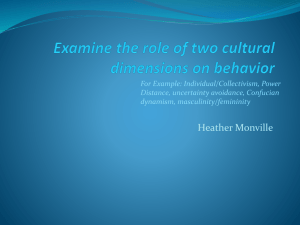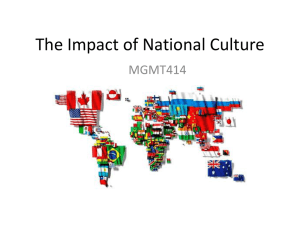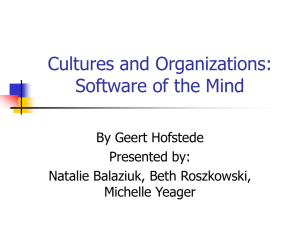Cultural models - Friday January 10-1
advertisement
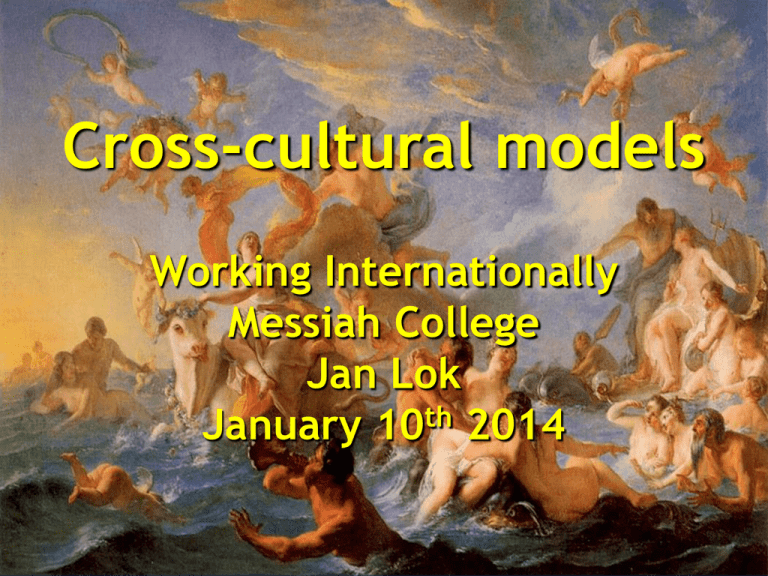
Cross-cultural models Working Internationally Messiah College Jan Lok January 10th 2014 Culture The system of shared beliefs, values, customs, behaviors, and artefacts that the members of society use to cope with their world and with one another, and that are transmitted from generation to generation through learning Culture "Culture is the way in which a group of people solves problems and resolves dilemmas", Hofstede, "Culture's Consequences", Sage, 1980. Cultural differences, according to Trompenaars, can be factorised down to differing attitudes to people, environment and time. "Culture works to justify its own initial suppositions" Trompenaars, Riding the Waves of Culture Manifestations of culture Main elements of culture / civilization: 1. Religion e.g. Christianity, Islam, Hinduism, Confucianism 2. History, shared past Western history, Arab history, Russian etc. 3. Language, the language families e.g. Indo-European, Turkic, Semitic, etc. 4. Ethnicity e.g. Bantu, Chinese, Caucasian, etc. + Self-identification `us' `them', ingroup outgroup Dutch artefacts Dutch symbols and heroes The real Hansje Brinker Values In order to understand cultural differences in your profession, you need to know the differences in values. Those values are determined by history, religion, language, upbringing etc. Dutch values and others European Values Study Morality Politics Education Morality Permissiveness: Acceptance of: Homosexuality Abortion Divorce euthanasia 1 = never; 10 = always Civic morality: Non-acceptance of: claiming state benefits illegally cheating on tax joy riding accepting a bribe 1 = never ; 10 = always 8.8 dk 8.6 c i v i c m o r a l i ty 8.4 ro hu 8.2 pl ir cr bg ni pt it is at w g eg uk sp ru nl fi cz sw 8 be lv ltua gr 7.8 sl ee lu fr 7.6 7.4 sk 7.2 by 7 3 4 5 6 permissiveness 7 8 Politics Confidence in institutions: How much confidence do you have in: Church, armed forces, education system, Press, trade unions, police, parliament, civil service Interpersonal trust: Would you say that most people can be trusted or that you can’t be too careful in dealing with people? Most people can be trusted % Can’t be too careful 70 dk sw In te r p e r s o n a l tr u s t 60 nl gr fi 50 eg by 40 it 30 cz ru hu eecr 20 wg ir at uk ua be bg is ni sp lt lu fr sl lv sk ro 10 mt pl pt 0 2.1 2.2 2.3 2.4 2.5 Confidence in institutions 2.6 2.7 2.8 Education Important qualities to teach children: ‘Classic’ : good manners, hard work, imagination, thrift, religious faith, obedience ‘Liberal’: independence, imagination, tolerance, determination 3 'c l a s s i c ' q u a l i t i e s mt ro pl 2.5 sk ru pt ua ee ni by lv hu ie bg gr cz it 2 lu uk be sp fr lt sl at is nl 1.5 fi eg wg se dk 1 1 1.2 1.4 1.6 1.8 liberal qualities 2 2.2 2.4 Cross-cultural models Hofstede & Trompenaars These models do not explain the cultural differences, but they try to classify them “Culture is always a collective phenomenon, because it is at least partly shared with people who live or lived within the same social environment, which is where it was learned. It is the collective programming of the mind which distinguishes the members of one group or category of people from another.” Geert Hofstede, Culture and Organizations: Software of the Mind. New York, McGraw-Hill, 1991 1. Collectivism versus Individualism In individualistic countries (UK, Germany, South Africa, Canada, etc.), people are expected to look out for themselves. Typical values are personal time, freedom, and challenge. In collectivist cultures (Mexico, Korea, Greece) individuals are bounded through strong personal and protective ties based on loyalty to the group. Values include group recognition, family honour etc. Individualism vs collectivism Individualism I small group independence personality ‘ Western ’ (still a lot of differences between USA & Holland) Collectivism we extended family, group interdependence harmony Portugal, Greece, Spain, Africa, Asia, Latin America 2. Power distance Small power distance (e.g. Denmark, New Zealand) expect and accept power relations that are more consultative or democratic. People relate to one another more as equals regardless of formal positions. Subordinates are more comfortable with and demand the right to contribute to and critique the decision making of those in power. Large power distance countries (e.g. Spain, Latin America, Asian countries) accept power relations that are more autocratic and paternalistic. Subordinates acknowledge the power of others simply based on where they are situated in certain formal, hierarchical positions. Strong correlation with religion! Power distance • • To what extent do we accept that some people have more power than others? High Low – – – hierarchical top-down Latin / USA egalitarian top-down / bottom-up Germanic / Dutch??? 3. Femininity versus Masculinity (Quality of life versus Achievement) Masculine cultures value competitiveness, ambition, assertiveness and the accumulation of wealth and material possessions (e.g. Slovakia, Japan) Feminine cultures place more value on positive relationships among people, cooperation and quality of life (e.g. The Netherlands, Sweden). Masculinity vs femininity Masculinity be the best ambition, competition money, performance success, technology Italy, Germany, UK, Belgium, USA Femininity don’t be different sympathy for the weak solidarity, caring environment Scandinavian countries, Holland 4. Uncertainty avoidance When uncertainty avoidance is strong, a culture tends to perceive unknown situations as threatening so that people tend to avoid them (e.g. South Korea, Japan, and Latin America). In countries where uncertainty avoidance is weak (e.g. the US; the Netherlands; Singapore; Hong Kong, Britain) people feel less threatened by unknown situations. Therefore, they tend to be more open to innovations, risk, have more nonconformist behaviour etc. 5. Long-term versus short-term orientation New dimension: describes a society's attachment to the future versus the past and present. In long term oriented societies, values include persistence (perseverance), ordering relationships by status, thrift, and having a sense of shame. (E.g. China, Japan) In short term oriented societies, values include normative statements, personal steadiness and stability, protecting ones face, respect for tradition, favors, and gifts (Western world). Power Distance Uncertainty Avoidance Individualism Masculinity Argentina 49 86 46 56 Brazil 69 76 38 49 France 68 86 71 43 India 77 40 48 56 Japan 54 92 46 95 Mexico 81 82 30 69 Netherlands 38 53 80 14 U.S.A. 40 46 91 62 Implications of dimensions Significant statistical relationships • • • • • Examples (out of 400) Power Distance large: more perceived corruption Uncertainty Avoidance strong: stress on law and order Individualist, not collectivist: higher Human Rights rating Feminine, not masculine: higher welfare budgets Long term, not short term orientation: higher savings rates Introduction Trompenaars http://tedxtalks.ted.com/video/Riding-thewaves-of-cultureFon;search%3Atag%3A%22netherlands%22 Trompenaars 1. Universalism vs. Particularism What is more important: rules or relationships? For example: the rule that you should bear thruthful witness in a court of law, or give your honest judgment to the insurance company concerning a payment it is about to make to you, is more important here than particular ties of friendship or family. But the universal truth, the law, is considered logically more significant than these relationships. U: consistent, rules, uniform procedures etc. P: flexible, pragmatic, exceptions are possible Friend would not help: Switzerland Canada USA Sweden United Kingdom Australia Netherlands Germany Estonia Czech Rep France Singapore Japan India China Russia Korea Venezuela 97 93 93 92 91 91 90 87 85 83 73 69 68 54 47 44 37 32 0 20 40 60 80 100 Other six dimensions Individualism vs. Communitarianism Specific vs. Diffuse Do we have to prove ourselves to receive status or is it given to us? Perception of Time Do we display our emotions? Achievement vs. Ascription How far do we get involved? Affective vs. Neutral Do we function in a group or as an individual? Future oriented or past oriented? Internal vs. External control Do we control our environment or work with it ? Ad. Specific vs. Diffuse A boss asking to paint his house The colleague argues: You don’t have to paint the house if you don’t feel like it. He is your boss in the company. Outside the company, he has little authority The subordinate argues: Despite the fact that I don’t feel like it, I will paint the house anyway. He is my boss and you cannot ignore it outside your work either. Would not paint the house Sweden Netherlands Denmark UK Canada USA Australia Japan Mexico Thailand Greece Belgium Estonia Singapore Venezuela Kuwait Nigeria China 91 91 89 88 87 82 78 71 70 69 67 66 65 58 52 47 46 32 0 20 40 60 80 100 Specific Many components in one’s personal life Interactions between people are well defined Large public sphere Standards, contracts Diffuse All elements in one’s personal life are related Large private sphere A friend is a friend in all respects of life Various roles are not seperated Ad. Achievement vs. Ascription What you do STATUS Who you are Ad. Time Past oriented cultures (e.g. Ireland) Present oriented cultures (e.g. Spain) Future oriented cultures (e.g. USA) Some consequences … USA Business Culture Shareholder Value Limitless Growth “Winner takes all!” Use power Result driven Many hours of work Dutch Business Culture Stakeholder Value Sustainable Growth Social Responsibility First: talk Process is important Working fast How to explain this?

